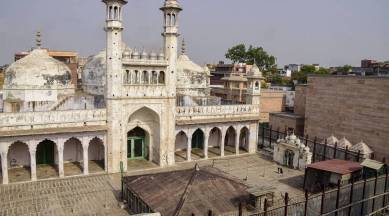Stay updated with the latest - Click here to follow us on Instagram
Gyanvapi Case: Petitioners’ claim of puja at mosque site till 1993 fictitious, HC told
Senior Advocate Syed Farman Ahmad Naqvi, who represented the AIMC in the High Court, said that the claims were being made to bypass the Places of Worship Act, 1991.

Lawyers representing the Anjuman Intezamia Masjid Committee (AIMC) on Thursday told the Allahabad High Court that the claims made by the lawyers representing the Hindu side that puja was performed at the Gyanvapi mosque complex till 1993 were “fictitious”.
Senior Advocate Syed Farman Ahmad Naqvi, who represented the AIMC in the High Court, said that the claims were being made to bypass the Places of Worship Act, 1991.
The Act prohibits conversion of any place of worship and provides for the maintenance of the religious character of any place of worship as it existed on August 15, 1947.
Naqvi told the court that the Hindu side made a “fictitious claim” that puja was performed at the mosque complex till 1993 and that it was stopped by an “oral order”. The court was hearing a civil revision filed by the AIMC, challenging the maintainability of the suit filed by five Hindu women who are seeking the right to “worship deities in the Gyanvapi mosque complex”. A local court in Varanasi on September 12 rejected the AIMC’s application challenging the maintainability of the suit.
“The first thing we told the court was that the suit filed by the Hindu side is not maintainable because there is no cause of action. The cause of action is of 1993 – when the Hindu side says that puja was stopped at the site by the then government. And as per provisions of the Limitation Act, the limitation for seeking a decree of declaration is three years. And that has passed as it ended in 1996. They didn’t seek any relief and didn’t file a suit within that period,” Naqvi said.
“I also told the court that the claim of the Hindu side that puja was stopped by the state government through an oral order in 1993 is a fictitious claim to bypass the Places of Worship Act. The state government never passes any oral orders. It should be in writing. It is unheard of a government order given orally. Also, the state government is not coming ahead with anything to substantiate the claim before the High Court or other courts. It is an artificial date given by the Hindu side to bypass the Places of Worship Act which says that the nature of a religious place shall remain the same as it was in 1947,” Naqvi added.
Advocate Hari Shankar Jain, who is representing the five women in the High Court, said, “I told the court that the religious character of the place is Hindu and not of the Muslims, and the puja was being performed at the site for ages. The temple was destroyed and a structure was built. If someone destroys a temple and builds a mosque, it can’t be considered a mosque as per Islamic laws. The property doesn’t have a Waqf deed.”
Asked about the Muslim side’s contention regarding the state government giving an order to allegedly stop puja at the site, Jain said, “That is a presumption. It will become clear when the government files a reply in the court.”
“Till 1993, puja was performed there and the Mulayam Singh government put up barricades and barred entry of Hindus,” he claimed